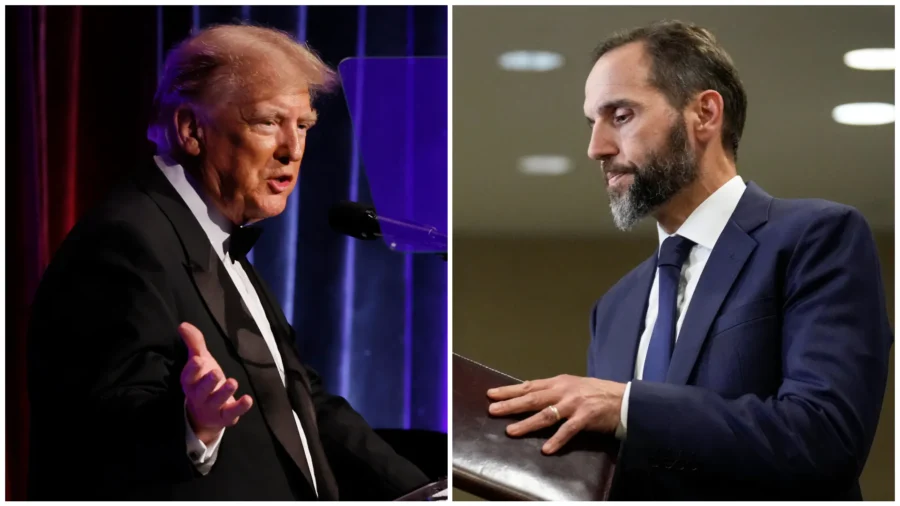In court filings March 7, Special Counsel Jack Smith pushed back on claims that he lacked the authority to prosecute former President Donald Trump, an argument that has been pushed by Reagan-era U.S. Attorney General Edwin Meese III (pdf) and picked up by Trump attorneys in a motion to dismiss the case Mr. Smith is leading in the Southern District of Florida.
President Trump has been charged with 40 counts related to allegedly mishandling classified documents, and Mr. Smith was appointed special counsel on Nov. 18, 2022, leading to two cases against President Trump. In Washington, D.C., President Trump was charged with four counts of obstruction and conspiracy for his actions on Jan. 6, 2021.
“The Attorney General has the statutory authority to appoint a Special Prosecutor,” prosecutors argued. “Section 533 confirms that “[t]he Attorney General may appoint officials . . . to detect and prosecute crimes against the United States.”
“The Special Counsel has the legal authority to prosecute this case.”
Appointments Clause
Defense attorneys argued that the Constitution’s Appointments Clause states that federal officers must be established by Congress and approved by the Senate, and there is no statute that establishes an office of the special counsel.
Prosecutors argued that Congress has given the U.S. Attorney General “all functions of other officers in the Department of Justice,” including to commission attorneys and special attorneys. That the special counsel’s funding comes from the Department of Justice does not contradict these statutes, the argued.
“Consistent with prior practice, the Department of Justice has funded the Special Counsel through a ‘permanent indefinite appropriation’ that Congress enacted in 1987 to “pay all necessary expenses of investigations and prosecutions by independent counsel appointed,” the filing reads.
Prosecutors argue the investigation is “lawfully funded” and “the lawfulness of this practice is confirmed by statutory text, history, and longstanding practice (including funding for a special counsel appointed during Trump’s administration).”
The DOJ was established through a 1870 statute which included stipulations related to hiring and paying outside counsel as special attorneys, “restricting their compensation.” In 1906, laws were updated to allow special counsel to conduct grand jury proceedings. There was “widespread use of special counsel,” and “Congress never questioned the Attorney General’s power of appointment,” prosecutors argued.
Amicus Argument
Mr. Meese has submitted more than one amicus brief in cases Mr. Smith is prosecuting against President Trump, arguing that the “legality of Jack Smith’s appointment is a potentially fatal flaw in this entire prosecution, and as such must be resolved before this case proceeds to trial in the district court.”
The argument is based on the appointments clause, which stipulates only Congress can create a federal office, subject to presidential nomination and Senate confirmation.
Mr. Meese argues that Attorney General Merrick Garland “exceeded his legal authority” in appointing Mr. Smith to a new office. The statute that allows attorneys general to appoint officers, including outside counsel, “does not authorize creating any offices.”
Furthermore, “§ 533(1) is not a general authorization to the Attorney General to appoint officers. It specifically and solely authorizes the appointment of ‘Investigative and Other Officials’—officials, not officers—connected with the FBI. This does not include Special Counsels,” he wrote in an amicus brief filed with the Supreme Court on Feb. 20, related to a presidential immunity appeal President Trump has lodged in the Jan. 6 case Mr. Smith is prosecuting. The brief was coauthored with constitutional law scholars Steven Calabresi and Gary Lawson.
Funding Issue Unrelated to Indictment
Prosecutors added that arguments related to the funding of the office of the special counsel would not permit the defense to make a motion to dismiss the charges.
“Trump’s argument therefore concerns only whether the Department relied on the correct appropriation or should have paid certain expenses and salaries for the Special Counsel’s Office using a different appropriation,” the new filing reads.
“He cites no case where a defendant was permitted to raise that kind of argument in a motion to dismiss an indictment, much less a case where such relief was granted.”
They add that parties normally can only invoke legal provisions meant to protect their rights and interests, and the statutes related to DOJ funding would be unrelated to “the litigant’s injury.”
“The indictment here was not caused by the particular identity of the appropriation that the Department relied on when funding the Special Counsel’s Office,” the filing reads.
From The Epoch Times

